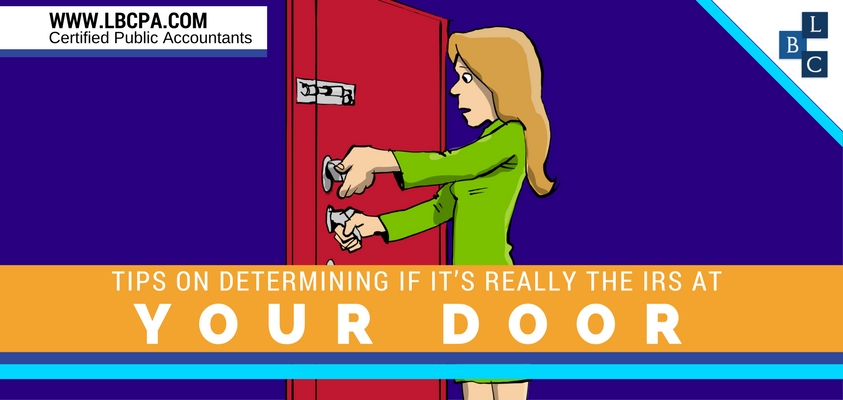LBCPA News 
Click here to go back
Tips on Determining If It’s Really The IRS At Your Door

WASHINGTON — The Internal Revenue Service has created a special new page on IRS.gov to help taxpayers determine if a person visiting their home or place of business claiming to be from the IRS is legitimate or an imposter.
With continuing phone scams and in-person scams taking place across the country, the IRS reminds taxpayers that IRS employees do make official, sometimes unannounced, visits to taxpayers as part of their routine casework. Taxpayers should keep in mind the reasons these visits occur and understand how to verify if it is the IRS knocking at their door.
Visits typically fall into three categories:
IRS revenue officers will sometimes make unannounced visits to a taxpayer’s home or place of business to discuss taxes owed or tax returns due. Revenue officers are IRS civil enforcement employees whose role involves education, investigation, and when necessary, appropriate enforcement.
IRS revenue agents will sometimes visit a taxpayer who is being audited. That taxpayer would have first been notified by mail about the audit and set an agreed-upon appointment time with the revenue agent. Also, after mailing an initial appointment letter to a taxpayer, an auditor may call to confirm and discuss items pertaining to the scheduled audit appointment.
IRS criminal investigators may visit a taxpayer’s home or place of business unannounced while conducting an investigation. However, these are federal law enforcement agents, and they will not demand any sort of payment. Criminal investigators also carry law enforcement credentials, including a badge.
For more information, visit “How to know it’s really the IRS calling or knocking on your door” on IRS.gov.
The IRS reminds people who owe taxes – or think they do – to stay alert to scams that use the IRS as a lure. Tax scams can happen any time of year, not just at tax time. For more information, visit “Tax Scams and Consumer Alerts” on IRS.gov.
Taxpayers have a set of fundamental rights they should be aware of when dealing with the IRS. These are your Taxpayer Bill of Rights. Explore these rights and the agency’s obligations to protect them on IRS.gov.
If you have any questions regarding accounting, domestic taxation, international taxation, IRS representation, U.S. tax implications of Real Estate transactions or financial statements, please give us a call at 305-274-5811.






